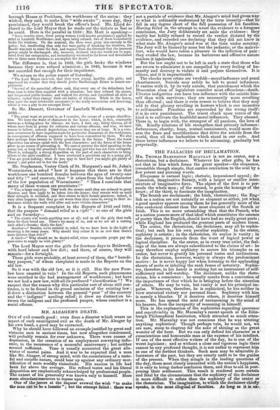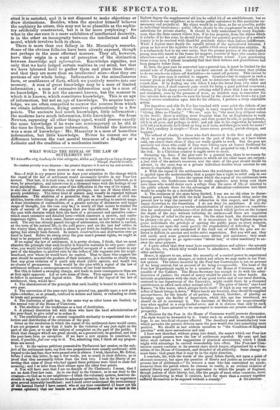THE FALLACIES OF DECLAMATION.
Mn. THOMAS BABINGTON MACAULAY is not an- orator, nor a rhetorician, but a declaimer. Whatever his other gifts, he has not that in him which forms the great speaker—the eloquence, irresistible though simple, that carries conviction to the soul by a few potent and piercing words. Eloquerce is earnest logic ; rhetoric, impassioned appeal ; de- clamation, imaginative fluency, with a larger or smaller inter- mixture of 'imaginative force. The object of the first is to per- suade the whole man of the second, to gain the homage of the heart ; of the third, to; fascinate the imagination.
The Scotch are declaimers; the Irish, rhetoricians ; the Eng- lish as a nation are not naturally so eloquent as either, yet when
a good speaker appears among them he has generally more of the 0
true oratorical element than the most eloquent of the Scotch or Irish. This is no more astonishing than that the French, who as a nation possess more of that ideal which constitutes the essence of poetry than the English, should have had no really great poets ; while England has produced the greatest poets of modern times.
The orator, the rhetorician, the declaimer, may all be sophis- tical ; but each has his own peculiar sophistry. In the orator, sophistry is artistic ; in the rhetorician, its source is vanity ; in the declaimer, it proceeds from the want of logical power or' logical discipline. In the orator, as in every true artist, the feel- ings of the man are always subordinated to the claims of art : he may therefore employ sophistry to secure his triumphs as an orator, but never to gratify his personal tastes and inclinations. In the rhetorician, however, -vanity is always the predominant motive : he is never happy but when listening to the applauding shouts of mobs or inhaling the rank fumes of notoriety. Sophis- try, therefore, in his hands is nothing but an instrument of self- sufficiency and self-worship. The declaimer, unlike the rheto-• rician, has a conscience : he usually speaks from a conviction of the importance of that which he is bringing before the attention of others. He may be vain, but vanity is not his principal im- pulse. Whenever, therefore, he is sophistical, he has neither in view oratorical victory nor personal fame. Sophistry with him is merely a blunder. If it deceives others, it deceives himself more. He has spread the mist of unreasoning in the mind of his hearers, from the incapacity of reasoning in himself. This is the explanation of the sophistries regarding ignorance and superficiality in Mr. Macaulay's recent speech at the Edin- burgh Philosophical Institution, which attracted so much atten- tion. Mr. Macaulay was not conscious that he was uttering anything sophistical. Though perhaps vain, he would not, we are sure, stoop to claptrap for the sake of shining as the great wonder of the hour. But we can only defend his character as a' conscientious and honourable man at the expense of his intellect. If one of the most effective writers of the day, he is one of the worst logicians ; and as without a close and vigorous logic there cannot be any profound thought, it is not unfair to represent him as one of the feeblest thinkers. Such men may be admirable il- lustrators of the past, but they are utterly unfit to be the guides of the present. When they mingle in the leading questions of the day, those most closely connected with the nation's happiness, it is only to bring darker confusion there, and thus to aid in post- poning their settlement. This result is rendered more certain and fatal by the circumstance that the sophistry of the declaimer is more difficult to refute than the sophistry of the orator or the rhetorician. The imagination, to which the declaimer chiefly speaks, is the most illogical of faculties. As long as it is ex-.
cited it is satisfied, and it is not disposed to make objections or draw distinctions. Besides, when the speaker himself believes the sophistry he utters, this may not be so plausible as the sophis- try artificially constructed, but it is far more perplexing : for what in the one case is a mere exhibition of intellectual dexterity, is in the other an incongruity between the intellectual and the moral, which involves both in chaos.
There is more than one fallacy in Mr. Macaulay's remarks. Some of the obvious fallacies have been already exposed, though not perhaps in the most effectual manner. They all, however, have their origin in a want of perception of the distinction between knowledge and information. Knowledge signifies, not only that we have lodged certain realities in our mind, but that we have laboured hard to gather them and place them there ; and that they are more than an intellectual store—that they are portions of our whole being. Information is the miscellaneous facts, or semblances of facts, which we passively receive into our memory. A man of great knowledge may be a man of limited information ; a man of extensive information may be a man of no knowledge. It is not the amount known, but the manner in which it is known, which constitutes knowledge. This is an age of information, but not an age of knowledge. To acquire know- ledge, we are often compelled to narrow the sources from which we obtain information, fixing ourselves pertinaciously to a few points. The ancients had much knowledge, little information ; the moderns have much information, little knowledge. Sir Isaac Newton, supposing all other things equal, would possess exactly the same knowledge if he were our contemporary as he did at the time he lived, but more information. Niebuhr the historian was a man of knowledge : Mr. Macaulay is a man of boundless information, but little knowledge. Hence he cannot see the difference between the vast mental treasures of a Scaliger or a Leibnitz and the crudities of a mechanics institute.



























 Previous page
Previous page